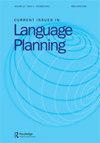从语言市场的角度理解中国外语学习者对外语的认知和选择
IF 1.8
1区 文学
Q2 EDUCATION & EDUCATIONAL RESEARCH
引用次数: 8
摘要
摘要本研究考察了中国的LOTE(英语以外的语言)学生如何将英语及其目标语言视为具有不同价值的不同类型的语言资本,以及他们如何在语言学习中发挥微观层面的LPP(语言规划和政策)行动者的作用。数据是从对35名大学生(包括印地语、波斯语和泰语学习者)的深入采访中收集的,并通过语言规划和政策中的个人能动性以及布迪厄人对语言资本和语言市场的构建进行分析。研究结果表明,英语被视为必备条件,而LOTE则被LOTE学习者视为加分项。研究还发现,英语学习似乎是LOTE学习者的默认选择,而LOTE学习往往是他们语言学习投资中的额外选择。这些发现具有反直觉的含义,即在没有认识到LOTE学习者作为微观LPP代理人的作用以及职业发展的个人需求与对高级多语言人员的宏观和微观需求之间的差距的情况下,LOTE教育规划和政策可能有助于英语对LOTE的统治,而不是提高(超)国家语言能力以及多语言和多元文化的多样性。本文章由计算机程序翻译,如有差异,请以英文原文为准。
Understanding China’s LOTE learners’ perceptions and choices of LOTE(s) and English learning: a linguistic market perspective
ABSTRACT This study examines how China’s LOTE (languages other than English) students perceive English and their target languages as different types of linguistic capital with different values, and how they exercise their agency as micro level LPP (language planning and policy) actors in language learning. Data were gathered from in-depth interviews with 35 university students (including Hindi, Persian and Thai learners) and analysed through the lens of individual agency in language planning and policy, as well as the Bourdieusian constructs of linguistic capital and the linguistic market. The findings reveal that English is regarded as a requisite, while LOTE(s) is/are perceived as a plus by LOTE learners. It was also found that English learning seems to be a default choice among LOTE learners, while LOTE learning is more often an extra choice in their language learning investment. Such findings have a counter-intuitive implication, namely that without recognizing the role of LOTE learners as micro LPP agents and the gap between the individual needs of career development and the macro and meso level demands for high-level multilingual personnel, LOTE education planning and policy may contribute to the English domination over LOTE(s) rather than enhancing (supra-)national linguistic capacity and multilingual and multicultural diversity.
求助全文
通过发布文献求助,成功后即可免费获取论文全文。
去求助
来源期刊

Current Issues in Language Planning
Multiple-
CiteScore
4.80
自引率
16.70%
发文量
26
期刊介绍:
The journal Current Issues in Language Planning provides major summative and thematic review studies spanning and focusing the disparate language policy and language planning literature related to: 1) polities and language planning and 2) issues in language planning. The journal publishes four issues per year, two on each subject area. The polity issues describe language policy and planning in various countries/regions/areas around the world, while the issues numbers are thematically based. The Current Issues in Language Planning does not normally accept individual studies falling outside this polity and thematic approach. Polity studies and thematic issues" papers in this journal may be self-nominated or invited contributions from acknowledged experts in the field.
 求助内容:
求助内容: 应助结果提醒方式:
应助结果提醒方式:


